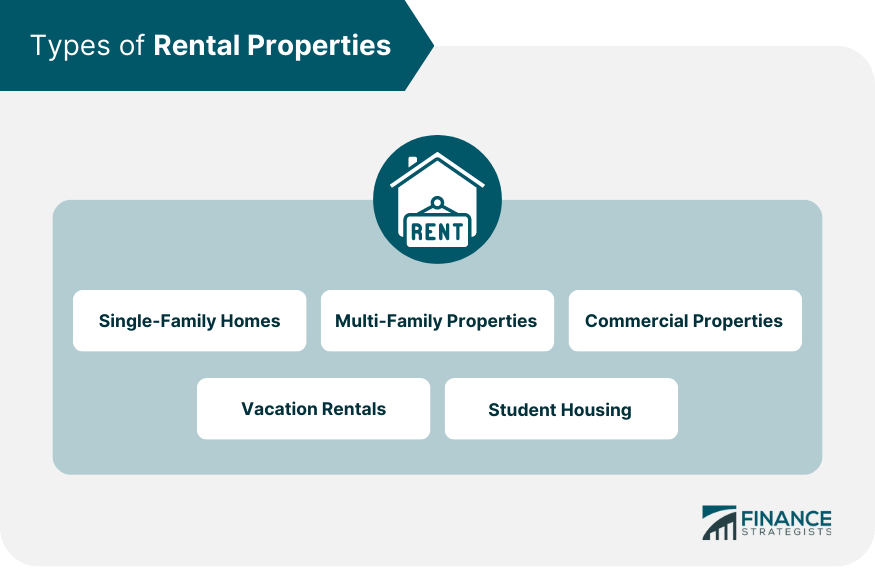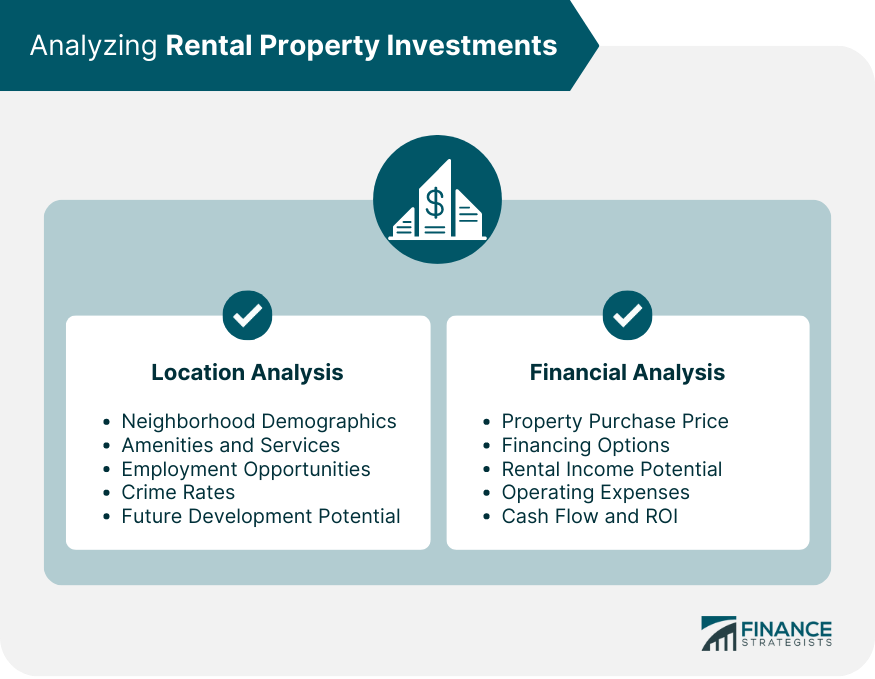Rental property investing is a popular and potentially lucrative form of real estate investment that involves purchasing properties with the intention of renting them out to tenants. This type of investing can provide investors with passive income, tax benefits, and long-term appreciation. However, it's essential to understand the risks involved and conduct thorough research before diving in. These properties consist of standalone homes that are designed for one family or household. Single-family homes are often the most straightforward type of rental property to manage, as they typically involve fewer tenants and maintenance concerns than other property types. Multi-family properties are buildings that house multiple tenants or families. These can range from duplexes and triplexes to large apartment complexes. Investing in multi-family properties can provide investors with economies of scale and potentially higher returns but may require more extensive management and maintenance. Commercial rental properties are spaces leased to businesses, such as office buildings, retail stores, or industrial warehouses. These investments typically involve longer lease agreements and may offer more stable rental income, but they can also be more complex to manage and subject to different market factors. Vacation rentals are properties that are rented out to tourists and travelers on a short-term basis. These properties can provide high rental income, but the income may be seasonal, and managing short-term rentals can be more time-consuming than traditional rentals. Student housing investments focus on properties near colleges and universities that cater to the needs of students. These properties can offer consistent demand, but they may require more frequent turnover and property maintenance. Consider the age, income, and family structure of residents in the area to ensure that the property is suitable for the target tenant demographic. Look for properties near schools, shopping centers, public transportation, and other amenities that tenants typically value. Properties in areas with robust job markets can attract higher-quality tenants and experience lower vacancy rates. Investing in low-crime neighborhoods can help ensure tenant safety and protect property values. Research local zoning regulations and upcoming development projects to gauge the potential for future growth in the area. Determine whether the property's price is in line with comparable properties in the area and offers an attractive return on investment. Consider the available financing options and their impact on the overall investment, including interest rates, down payment requirements, and loan terms. Estimate the property's potential rental income based on market rates and vacancy trends. Calculate the property's operating expenses, such as property taxes, insurance, maintenance, and property management fees. Evaluate the property's projected cash flow and ROI to ensure it meets your investment goals. Tenant Screening and Selection: Properly screening and selecting tenants can help ensure timely rent payments and minimize property damage. Rent Collection and Lease Agreements: Establish clear rent collection policies and well-crafted lease agreements to protect both the landlord and tenant. Property Maintenance and Repairs: Regularly maintain and promptly address repairs to protect the property's value and keep tenants satisfied. Tenant Communication and Conflict Resolution: Effective communication and conflict resolution skills can help maintain positive tenant relationships and reduce turnover. Legal Compliance and Insurance: Ensure compliance with local, state, and federal regulations and maintain appropriate insurance coverage to protect your investment. Traditional Bank Loans: Bank loans typically offer competitive interest rates and terms but may require a larger down payment and stricter credit requirements. Government-Backed Loans: Loans backed by government agencies like the FHA or VA can offer lower down payment requirements and more lenient credit standards but may come with additional fees and restrictions. Private Money Lenders: Private lenders may provide more flexible financing options but often charge higher interest rates and fees. Real Estate Investment Partnerships: Partnering with other investors can help spread risk and provide access to additional capital but may require shared decision-making and profit-sharing. Creative Financing Options: Seller financing, lease options, and other creative financing strategies can help investors acquire properties with little or no money down but may involve more negotiation and complex terms. Rental income is typically subject to federal and state income taxes, and investors must report this income on their tax returns. Investors can claim deductions for certain expenses related to rental property ownership and depreciate the property's value over time, which can help reduce taxable income. Utilize tax strategies like the 1031 exchange, real estate professional status, and cost segregation to maximize tax benefits. Understand the potential tax implications of selling a rental property, including capital gains tax and depreciation recapture. Accessing the equity in existing properties through refinancing or home equity loans can provide capital for additional property investments. Diversifying your rental property portfolio across different markets can help mitigate risks and capitalize on various opportunities. Employing professional property management companies can help streamline property management tasks and allow for more efficient portfolio growth. Build relationships with other investors, real estate professionals, and industry experts to stay informed and uncover new opportunities. Rental property investing offers a promising avenue for generating passive income, building wealth, and achieving financial freedom. To succeed, investors must carefully consider the various types of rental properties, conduct thorough location and financial analyses, and explore diverse financing options. Effective property management, understanding the tax implications, and employing growth strategies are crucial for optimizing returns and expanding a rental property portfolio. By remaining diligent, adaptive, and committed to continuous learning, investors can develop a successful rental property investment strategy that flourishes over time.What Is Rental Property Investing?
Types of Rental Properties

Single-Family Homes
Multi-Family Properties
Commercial Properties
Vacation Rentals
Student Housing
Analyzing Rental Property Investments

Location Analysis
Neighborhood Demographics
Amenities and Services
Employment Opportunities
Crime Rates
Future Development Potential
Financial Analysis
Property Purchase Price
Financing Options
Rental Income Potential
Operating Expenses
Cash Flow and Return on Investment (ROI)
Managing Rental Properties
Financing Rental Property Investments
Tax Implications of Rental Property Investing
Rental Income Taxes
Deductions and Depreciation
Tax Strategies for Rental Property Investors
Tax Implications of Selling a Rental Property
Growing a Rental Property Portfolio
Leveraging Equity and Refinancing
Diversifying Investments Across Markets
Utilizing Property Management Companies
Networking and Professional Development
Conclusion
Rental Property Investing FAQs
Rental property investing can provide investors with passive income, tax benefits, long-term appreciation, and opportunities for portfolio diversification. Success in this field requires thorough research, effective property management, and a strong understanding of market trends.
Consider factors such as your investment goals, available capital, and risk tolerance when deciding on the type of rental property. Single-family homes, multi-family properties, commercial properties, vacation rentals, and student housing each offer unique benefits and challenges. Carefully analyze the location, demographics, and financial potential of each property to ensure it aligns with your strategy.
When evaluating a rental property's location, consider neighborhood demographics, proximity to amenities and services, employment opportunities, crime rates, and future development potential. A well-located property can attract higher-quality tenants, maintain lower vacancy rates, and offer stronger long-term appreciation prospects.
There are several financing options for rental property investing, including traditional bank loans, government-backed loans, private money lenders, real estate investment partnerships, and creative financing strategies like seller financing or lease options. Each option has its own advantages, disadvantages, and requirements, so it's crucial to carefully research and compare them before making a decision.
To grow a rental property portfolio, investors can leverage the equity in existing properties through refinancing or home equity loans, diversify investments across different markets, utilize property management companies, and network with other investors and industry professionals. Continuously learning and adapting to market trends is essential for successful long-term rental property investing.
True Tamplin is a published author, public speaker, CEO of UpDigital, and founder of Finance Strategists.
True is a Certified Educator in Personal Finance (CEPF®), author of The Handy Financial Ratios Guide, a member of the Society for Advancing Business Editing and Writing, contributes to his financial education site, Finance Strategists, and has spoken to various financial communities such as the CFA Institute, as well as university students like his Alma mater, Biola University, where he received a bachelor of science in business and data analytics.
To learn more about True, visit his personal website or view his author profiles on Amazon, Nasdaq and Forbes.













